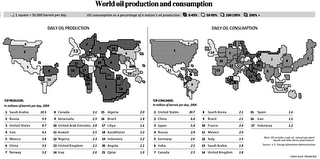"Drilled In" Gasoline Labeling
The Chicago Tribune has a nice series on oil. They trace oil from where it is pumped out of the ground to where it is pumped into your car and discuss all the issues surrounding it.
The following shows where the oil originated from that ended up at a gas station in Chicago:
Gulf of Mexico crudes--31 percent
Texas crudes--28 percent
Nigerian crudes--17 percent
Arab Light from Saudi Arabia--10 percent
Louisiana Sweet--8 percent
Illinois Basin Light--4 percent
Cabinda crude from Angola--3 percent
N'Kossa crude from the Republic of Congo--.01 percent
Which got me to thinking, why shouldn't all gasoline be labeled by where the oil was drilled? Just like clothing has a label that tells you where it was made, I think gasoline stations should have to tell you where the oil originated from. The idea would be to understand where you, and the US in general gets its oil. The image on the left shows where oil in produced and consumed in the world. The size of the countries reflects their impact on consumption or production. As expected the Middle East is a huge producer of oil, but Russia, Venezuela and the US are also large producers. On the consumption side, the US leads and Europe and Japan are also large consumers.
The idea would be to understand where you, and the US in general gets its oil. The image on the left shows where oil in produced and consumed in the world. The size of the countries reflects their impact on consumption or production. As expected the Middle East is a huge producer of oil, but Russia, Venezuela and the US are also large producers. On the consumption side, the US leads and Europe and Japan are also large consumers.
I was thinking this "drilled in" label could be used by customers to purchase gasoline from companies that get their oil from countries they support and boycott those they don't. If you want to make sure your money doesn't go to Saudi Arabia or Venezuela, you as a customer would now be able to do that.
But, I question how well that would work given that the world demand for oil is greater than supply. If you, or you and a bunch of your friends, or even the entire country decided to boycott Saudi Arabia, you would have to increase your oil purchases from somewhere else like Nigeria. Since Nigeria is already pumping as much as they can, an increase to the US means a decrease to somewhere else, lets say Canada. Now Canada needs to get more oil so where do they go? Saudi Arabia. So while demand for oil is so strong, I don't think you can have much of an effect. But, when demand drops below supply, then it could have an impact.
Regardless, knowing where we get our oil from is an important piece of information in this globalized world with a limited supply of oil.
via Chicago Tribune





No comments:
Post a Comment
Note: Only a member of this blog may post a comment.